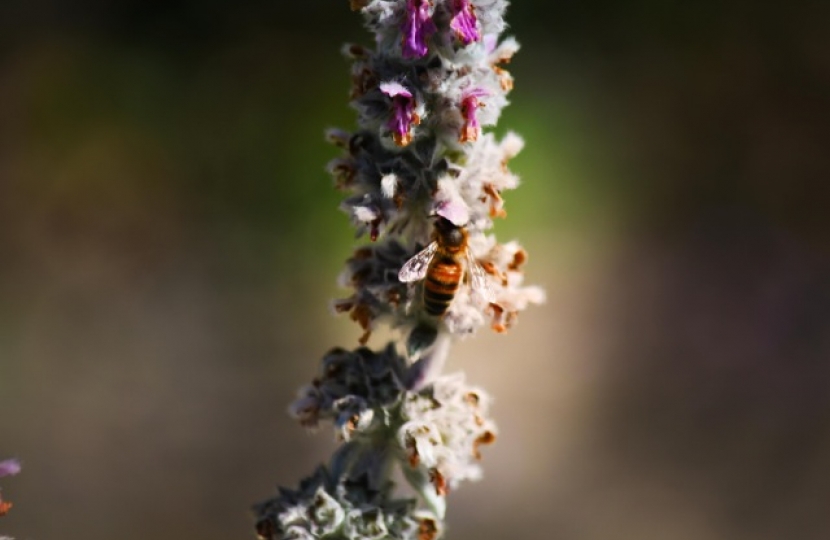
My comment on neonicotinoids (March 2023)
I am aware that the Department for Environment, Food and Rural Affairs (Defra) has approved emergency temporary authorisation for the use of the neonicotinoid pesticide Cruiser SB, due to the risks of yellows viruses to the UK's sugar beet crop.
When making this decision, the potential risks, such as any possible environmental harm, must be balanced against the potential benefits in addressing the danger, such as protection against a pest. In making this judgement, the Farming Minister considered the advice from the Health and Safety Executive, the Expert Committee on Pesticides and Defra’s Chief Scientific Adviser.
Emerging sugar beet seedlings are vulnerable to predation from aphids that have the potential to spread beet yellows virus. This can severely affect sugar beet yield and quality. In 2020, around 25 per cent of the national sugar beet crop was lost, which resulted in a total loss of £67 million across an industry that is linked to nearly 10,000 jobs.
I am assured by my ministerial colleagues in Defra that there are strict conditions to the emergency authorisation of Cruiser SB. This includes only allowing for application if independent modelling predicts a virus incidence of 63 per cent or above. This threshold is increased from the level that was applied in 2022. If the virus threshold is not met, then the neonicotinoid treated seed will not be used. I understand that the forecast as to whether the threshold has been met will be made on 1 March and it is only then that it will be confirmed whether the seed treatment will be used this year. In 2021, the model predicted that the virus level would not meet the threshold so the seed treatment was not used.
Finally, I am informed that if the threshold is met and limited use is allowed, then further strict conditions will be applied to minimise risks to the environment. This includes a maximum number of seeds planted per hectare and restrictions on farmers planting flowering crops in the same field within 32 months of a treated sugar beet crop, which will allow time for the chemical to break down.
--------------------------------------------------------------------------------------------------------------------------------------------------------------------------
Pollinators are an essential part of our environment and play a crucial role in food production through pollination. The National Pollinator Strategy sets out action ministers are taking to improve the status of bees and other pollinators in England on farmland and other areas.
These actions include restoring and creating habitat for bees and other wild and managed pollinators to thrive; acting on the pressures that impact on pollinators, including by supporting Integrated Pest Management; providing advice and raising awareness across society so that they can take action themselves; and supporting new monitoring and research. Further, the Healthy Bees Plan 2030 sets out additional action to improve honeybee health, alongside beekeeping associations and other interested parties.
The plan sets out four key outcomes to help protect honey bees:
- Effective biosecurity and good standards of husbandry, to minimise pest and disease risks and so improve the sustainability of honey bee populations.
- Enhanced skills and production capability/capacity of beekeepers and bee farmers.
- Sound science and evidence underpinning the actions taken to support bee health.
- Increased opportunities for knowledge exchange and partnership working on honey bee health and wider pollinator needs.
Launching the Healthy Bees Plan 2030, as Pollinators Minister, I said:
"During the coronavirus pandemic we have seen an increased connection with the natural world, and the new Healthy Bees Plan provides a blueprint to look after the health of some of our most important insects – the bees – our unsung heroes. Bee health stakeholders have had a key role in developing our plan, and we look forward to working together to help ensure our bees can survive and thrive for future generations."
Decisions on whether to authorise the use of individual pesticides always take account of environmental risks, including the potential for harm to bees. Ministers have also developed a draft National Action Plan for the Sustainable Use of Pesticides, which sets out the ambition to support the development and greater uptake of Integrated Pest Management to reduce pressures on biodiversity and the natural environment.
It is also encouraging that the UK is moving to an ambitious new agricultural system which will reward farmers and land managers for the work they do to look after and enhance our environment. This will encourage actions that support Integrated Pest Management, as well as those that conserve and enhance habitats for bees and other pollinators. Finally, the Government has introduced a national pollinator monitoring scheme with trend estimates published annually, and advice and guidance is also provided to landowners and the public through the Bees’ Needs campaign.
Pollinator Monitoring Scheme
To help establish the trends in pollinator populations the UK Pollinator Monitoring Scheme has been running since 2017, as part of the UK Pollinator Monitoring and Research partnership. The aim is to collect systematic data on the abundance of bees, hoverflies and other flower-visiting insects nationally. This year’s recording season started on 1st April so you can get involved now. The Flower-Insect Timed Count is very easy to undertake, simply involving counting all the insects visiting a particular flower in a 50 cm square for 10 mins. There is a list of 14 target flowers, which are the suggested best species to use, but you can use any flower. For more information go to the website - www.ukpoms.org.uk where there are very clear instructions of how to get involved.